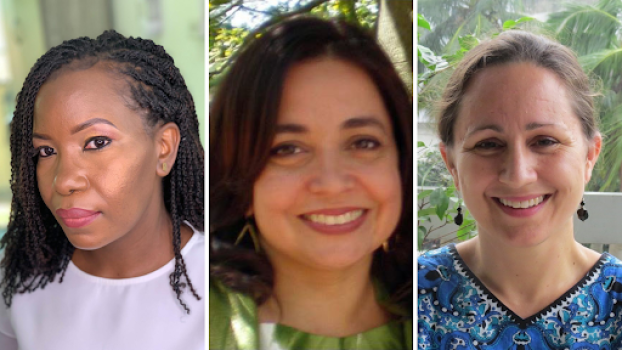This year’s Menstrual Hygiene Day theme is #WeAreCommitted, shifting from calling for action to leading by example by committing to action. We asked three USAID leaders to talk about their work to move the conversation about menstrual health and hygiene forward and destigmatize the topic of menstruation.
Beverly Mademba is a WASH Project Management Specialist with USAID/Kenya and East Africa, in the Office of Economic Growth and Integration. Mademba provides technical expertise on water, sanitation and hygiene and menstrual health and hygiene for the Mission’s programs.
Diana Prieto is the Director of USAID’s Office of Gender Equality and Women's Empowerment Hub. In this capacity, Prieto works with a global network of advisors to help support and advance the Agency’s work related to women’s equality and gender empowerment.
Kathrin Tegenfeldt is the Communications and Program Management Advisor at USAID/India. Before that, she was the WASH Advisor at USAID/Ethiopia and managed several menstrual health and hygiene activities.
How does your work support gender equality and female empowerment in WASH and MHH?
Kathrin Tegenfeldt: In Ethiopia, women have been largely marginalized when it comes to WASH. They tend to disproportionately bear the burden of WASH in their communities. They’re responsible for collecting water and for hygiene and sanitation around the house, yet they’re often not part of the solutions.
One of the most important roles I played was trying to make sure that women were at the table, that they were part of the solution, and their voices were being heard, considered, and included. At meetings where discussions centered around community WASH and women's needs, I often had to point out that I was the only woman in the room. Similarly, on project visits, I always tried to make sure that women's voices were heard when partners and colleagues were engaging with communities. That was one thing that I felt strongly about, always looking out to make sure people recognized that more women needed to be involved in all aspects of the process.
How can others commit to help advance Gender Equality and Female Empowerment in WASH and menstrual health and hygiene?
Beverly Mademba: The first and most important thing is to gather information. There is now more evidence and data available about menstrual health and hygiene, from the connection between effective menstrual health and hygiene and reproductive health issues to improvement of school attendance.
My second recommendation, particularly to WASH practitioners, is to collaborate and look at menstrual health and hygiene from a holistic approach. This is a multi-sectoral issue, and needs the attention of all sectors from education, health, WASH, trade, everything! It also requires everyone, so I encourage practitioners to include men and boys, menstruators, and non-menstruators alike.
Finally, I invite you to start conversations with people you know. Many of us live with menstruators and never had a conversation about their experiences. These conversations can lead to a greater understanding of their experience as well as learning more about the challenges and limitations they face as menstruators. We can break the stigma around menstruation when everyone starts to consider that they might be holding on to myths and taboos and unknowingly perpetuating these taboos.
What are you most proud of about the work being done to advance menstrual health and hygiene?
Diana Prieto: I’m pleased to see that we’re in a different place than we were a couple of years ago. I have seen an important change in a short period of time where things that were unspoken are now part of the conversation in regards to menstrual health and hygiene. Ultimately, a measure of important progress within USAID is that there are now particular steps, whether it is a clear and inclusive MHH definition and programming guidance or the way we’re tracking MHH investments, that we have built into our systems to underscore the importance of this work.
We have a long way to go but I think we’re in a good place with the development of a new technical brief and programmatic recommendations, support and testing MHH interventions, and furthering understanding of a multisectoral approach to MHH. This incremental change has been positive and has helped transform the work that we do to advance MHH as a central part of our gender equality and development programming.
By Global Waters Communication and Knowledge Management II team
Related Resources


